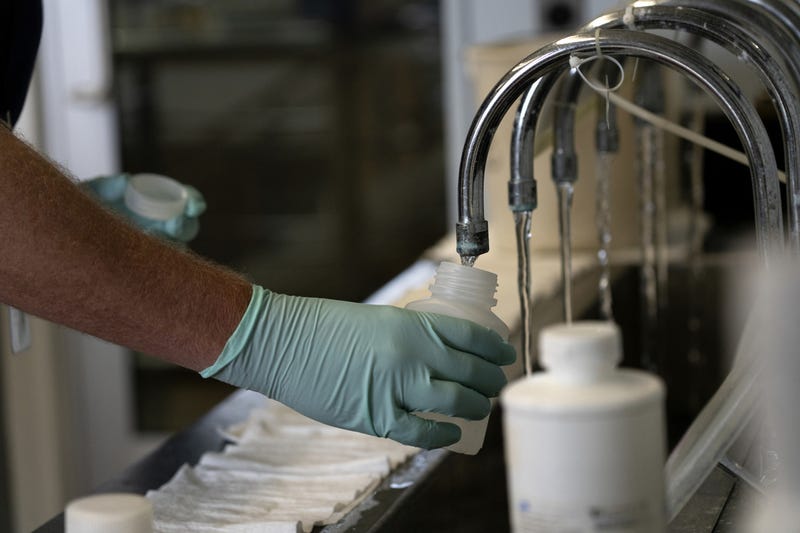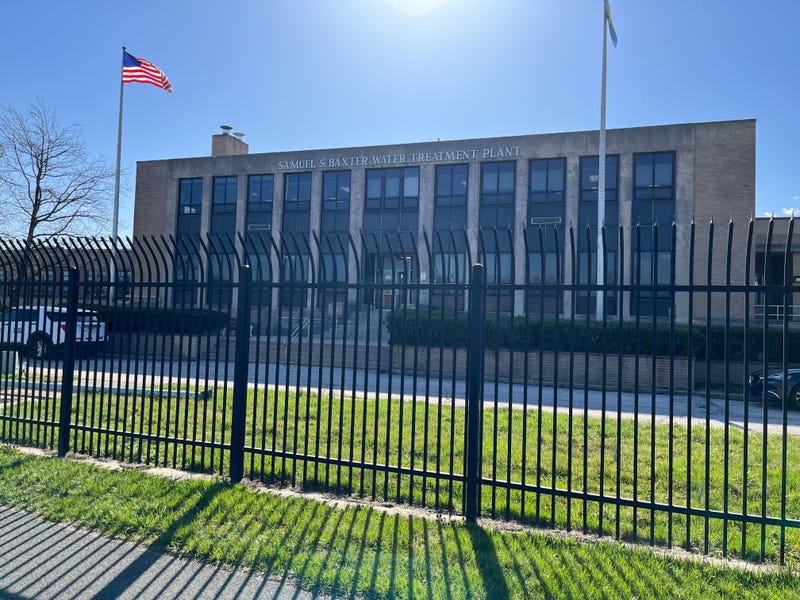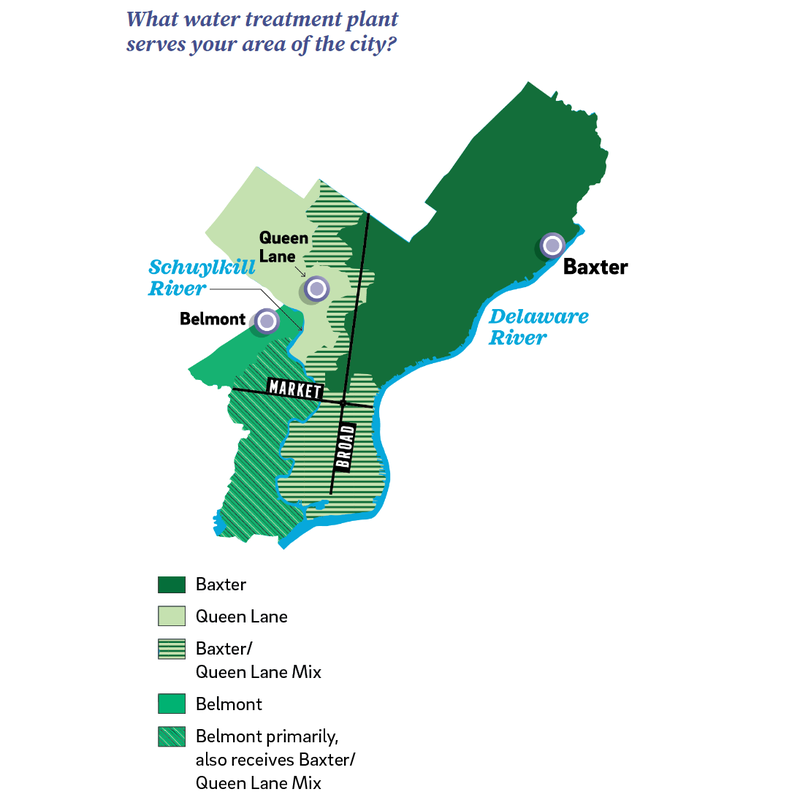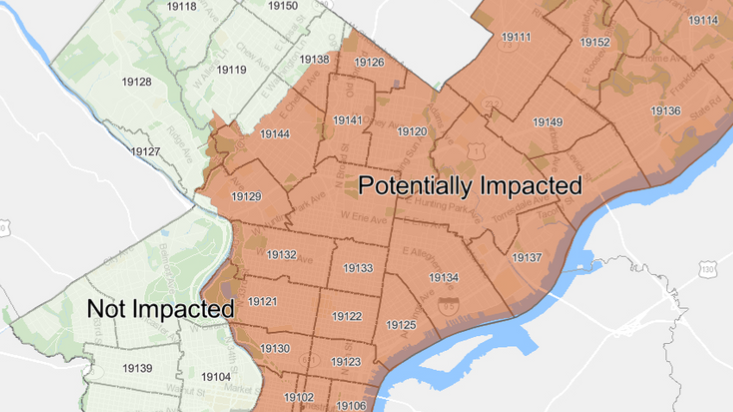
Updated March 28, 8:30 p.m.
PHILADELPHIA (KYW Newsradio) — Officials have declared the city's tap water safe to drink. They say there continue to be no detectable levels of the chemical spill near Philadelphia’s Delaware River intake, the threat of exposure has passed, and no further advisory is needed.
"I'm pleased to announce that Philadelphia's drinking water will not be impacted by the spill in Bucks County that occurred over the weekend. The tap water from the Baxter drinking water treatment plant will remain safe to drink," said Mayor Jim Kenney at a City Hall press briefing Tuesday evening.
Sampling has not detected any substance related to the Bristol Township discharge in the raw water basin or the water treatment system the Samuel S. Baxter Water Treatment Plant, he said. And models tracking the flow and tide of the Delaware River show the potential threat is water under the bridge.
"No residents were exposed to unsafe chemicals in the city's tap water," said the mayor. "Now we can all confidently say the threat has passed."
Mike Carroll, the managing director for the Office of Transportation, Infrastructure and Sustainability, went into greater detail about the methods and motives of the officials charged with the safety and well being of millions of people — but not before a bit of good-natured political theater.
"It's safe, it's contaminant free, and we can all enjoy. ... So "I will drink to that," he said, as he held up a glass of water and took a sip.
In giving an overview of the work involved, Carroll explained that hundreds of samples were taken.
"Throughout the whole event, no contaminants were ever found in Philadelphia drinking water," he said. "Nobody ever drank any water that had any contamination from this event."
Where your water comes from

The Baxter plant does not service all of Philadelphia. The city’s other two treatment plants draw water from the Schuylkill River, which would not have been affected by the spill.
The map below shows which of the three facilities serves which parts of the city.

The city made available an interactive map allowing residents and businesses to search by address to see if they were in area that was potentially threatened by the spill.

So, what happened?
The Department of Environmental Protection says 8,100 gallons of a "water-soluble acrylic polymer solution" were spilled into a Delaware River tributary in Bristol Twp., Bucks County, on Friday night. Trinseo, the company responsible for the spill, blames an equipment failure that caused a containment system to overflow into a storm drain.
The Philadelphia Water Department shut off intakes to the Baxter facility as a precaution and, since then, has been testing at 12 locations throughout the system — from the Delaware River intake, to the Baxter plant in Holmesburg, all the way through the distribution system carrying water to homes and businesses.
DEP says there have been no signs of impact on fish or wildlife but did not answer if there were any testing efforts along Otter Creek, Bristol Marsh or other areas along the Delaware River banks.
Trinseo says it voluntarily halted production at the plant but expects to resume partial production in the coming days and a return to full production “shortly thereafter.”
DEP acting Secretary Rich Negrin tweeted over the weekend that they would hold the responsible parties accountable. When asked for clarification, a DEP spokeswoman says the department does not comment on ongoing investigations or potential enforcement actions.
In daily briefings since Sunday, officials have said there has been no contamination from the spill.
In the city's most recent announcement, Tuesday morning, officials said there was enough treated, tested and uncontaminated water available in the system that, even in the event of a contamination emergency, residents would have been assured a safe water supply through at least 11:59 p.m. Wednesday.
If at any point test samples indicated a potential effect on the river water entering the Baxter plant, Water Department officials said they were prepared to notify the public immediately. And city officials were working with emergency response partners to develop a water distribution plan if the supply were to be compromised.
Carroll said Monday night that, even after the city gives the all-clear, the water supply would still be monitored and tested for a few days, as a contingency.
“We expect this to continue for a day or two after the condition is improved in the river,” he said.
City officials said Tuesday there will be no further briefings on the situation.
City's latest update
This is the final update that will be added to this post in response to this event. For any further information or updates, please visit the Philadelphia Water Department’s webpage.
Current guidance for residents
—The Philadelphia Water Department has declared Philadelphia’s drinking water is safe to drink and use.
—PWD has determined that Philadelphia’s drinking water will not be impacted by the spill in Bucks County.
—With this data showing no threat to public health, the City is ending the ongoing advisories about monitoring at the Baxter Drinking Water Treatment Plant.
—Philadelphia’s drinking water remains safe to drink and use.
—No contaminants have been found in PWD’s water system at any point since the spill.
Additional information
—Out of an abundance of caution and in coordination with PA DEP, PWD will continue enhanced monitoring of the Delaware River and the Baxter Drinking Water Treatment Plant for spill-related material. Information related to this incident, including water quality sampling results, will be made available on PWD’s website.
—PWD will conduct robust after-action evaluations and give direct attention to the infrastructure priorities and other long-term measures that are needed to strengthen the resiliency of Philadelphia’s drinking water system. These priorities are articulated in PWD’s Water Revitalization Plan.
Background on this event
—A synthetic latex product spilled from the Trinseo facility along a tributary of the Delaware River near Bristol Township, Bucks County, 13 miles north of the Baxter Drinking Water Treatment Plant intake, shortly before midnight on Friday, March 24, 2023.
—The product spilled is used in making products such as headlight covers. The primary substances that were tested for were butyl acrylate, ethyl acrylate, and methyl methacrylate.
—PWD was notified by the Delaware Valley Early Warning System at 12:37 a.m. on Saturday, March 25, 2023.
—In response, PWD shut intakes to the Baxter Drinking Water Treatment plant as a precaution and worked diligently with partners to institute a rigorous monitoring plan to determine whether any contaminated water entered the Baxter Drinking Water Treatment Plant.
—The Baxter Drinking Water Treatment Plant is one of three main water treatment facilities that provide water to the City’s residents.
Constant testing and announcements
While some residents may have felt uneasy with the daily updates and constantly shifting advisory timelines, a clean water advocate says those updates meant the city was following the science.
“Folks should feel safe to drink the water that’s coming out of the tap today,” she said. “The frequent updates from the Water Department, what that assures me is that they’re dynamically testing what’s coming from the treatment plants and that they’re monitoring the situation,” said Stephanie Wein of PennEnvironment.
The water emergency caused many to panic-buy bottled water wherever they could find it. While that’s helpful in an emergency situation, Wein said it’s not a long-term solution.
“The thing about municipal water in big cities like Philadelphia is that it is more highly monitored, more tested, more regulated, has better oversight than the bottled water on store shelves,” she explained.
The experience of the last three days should serve as a reminder to residents to be prepared for emergencies and to keep three days' worth of emergency drinking water stored, which is standard Federal Emergency Management Agency guidance, Carroll said.
"Save your money," said Carroll Tuesday night — if people want to store safe water, they can fill up bottles, pitchers and jugs with tap water.
Carroll thanked members of the public for their understanding and said the various teams involved in the response effort will now review, evaluate and refine how they handle such emergencies.
How to stay informed
—To get alerts about drinking water quality, sign up for ReadyPhiladelphia by texting READYPHILA to 888-777. Get free phone alerts or customize free text and email alerts by visiting the Office of Emergency Management’s website at www.phila.gov/ready.
—For official updates from the city, follow @PhilaOEM on Twitter or Facebook.
—Other city Twitter accounts to follow for information: @PhiladelphiaGov and @PhillyH2O.
KYW Newsradio's Eric Walter, Pat Loeb, Tim Jimenez, Jim Melwert and John McDevitt contributed to this report.
